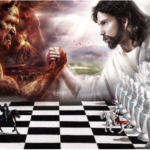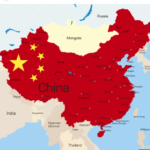Do you know how in Russia they view the armed conflict between Russia and the West, which is taking place mainly on Ukrainian territory? They view it as a struggle between good, which is Russia, and evil, which is the West; as a struggle between God, in whose name Russia is fighting, and Satan, in whose name the West is fighting. No more and no less. Note that this view is held by both Russian Christians and Russian atheists; Russians who pray in Orthodox churches and Russians who could be called neo-Bolsheviks. What’s more, these two groups work together in this regard, and although they represent different (once hostile to each other) worldviews, each group is closer to each other than to what the West represents.
Why do Russians consider the West to be forces of evil, forces of Satan, forces from hell? Here’s why. The so-called values that are promoted in Western countries – in the United States, Canada and the European Union – are abhorrent to most Russians. These include:
① blatant propaganda of sexual perversion, gender reassignment and also denial of the existence of biological sex;
② the populating of the West with anthropological types from the Third World;
③ the cutting off of the West from its own past, its own national heroes, its own cultural and religious roots, i.e. Christianity;
④ promoting the worship of Satan (as President Vladimir Putin has also mentioned in statements on more than one occasion), e.g., the opening of Satanic temples, the so-called artistic Satanic performances (rituals?) accompanying the opening of the London Olympics (2012) or the diabolical rituals accompanying the opening of the St. Gotthard Tunnel (2016);
⑤ supporting Nazis and bandits in Ukraine (whose photos of bodies covered with tattooed swastikas circulated throughout Russia).
The notion, belief or even deep conviction that Russia is defending European civilization and Christian faith as well as elementary morality is drawn by Russians from the works of Russian literature (Fyodor Dostoevsky), the prophecies of mystics (the Bulgarian visionary Baba Vanga, extremely popular in Russia) and common sense (i.e., a mind that Western propagandists have failed to poison as they have managed to do so with minds in the West). The West’s aggression against Russia, against Russians and everything Russian proved to be the last straw: it made the vast majority of Russians rally around their own national interest.
Consider that Russia was already acting as the liberator of Europe when it defeated the anti-Christian and anti-civilization forces spawned by the French Revolution of 1789. Let’s remind ourselves that before Russia liberated Europe in general and France in particular, huge numbers of Frenchmen (and not only Frenchmen!) fleeing the Jacobin massacres found refuge precisely in Russia. The future post-revolutionary King Louis XVIII of France found sanctuary in the Russian Empire. The world-famous military theorist and author of the work “On War” Carl von Clausewitz fought on the Russian side from 1812 to 1815, along with many other Prussian officers as part of the Russian-German Legion against revolutionary France, disagreeing with the fact that his homeland of Prussia had gone along with Napoleon Bonaparte. Continue reading





















